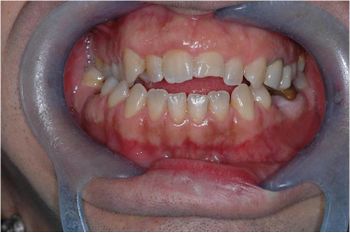Difference between revisions of "'Introduction'"
| Line 7: | Line 7: | ||
==Abstract== | ==Abstract== | ||
[[File:Occlusal Centric view in open and cross bite patient.jpg|350x350px|left]] The introduction to Masticationpedia provides a comprehensive overview of how scientific paradigms evolve, with a special emphasis on medicine and dentistry. It explores the epistemological shifts influenced by Thomas Kuhn's notion of paradigm changes, emphasizing their profound impact on dental sciences, particularly in masticatory rehabilitation. The text advocates for an interdisciplinary approach, introducing "metacognitive scaffolds" to aid communication across different scientific disciplines, and challenges traditional views on malocclusion, promoting a holistic approach that encompasses the complexity of the masticatory system. | [[File:Occlusal Centric view in open and cross bite patient.jpg|350x350px|left]] The introduction to Masticationpedia provides a comprehensive overview of how scientific paradigms evolve, with a special emphasis on medicine and dentistry. It explores the epistemological shifts influenced by Thomas Kuhn's notion of paradigm changes, emphasizing their profound impact on dental sciences, particularly in masticatory rehabilitation. The text advocates for an interdisciplinary approach, introducing "metacognitive scaffolds" to aid communication across different scientific disciplines, and challenges traditional views on malocclusion, promoting a holistic approach that encompasses the complexity of the masticatory system. | ||
==Ab ovo== | ==Ab ovo== | ||
Revision as of 11:44, 28 April 2024
'Introduction'
Abstract
The introduction to Masticationpedia provides a comprehensive overview of how scientific paradigms evolve, with a special emphasis on medicine and dentistry. It explores the epistemological shifts influenced by Thomas Kuhn's notion of paradigm changes, emphasizing their profound impact on dental sciences, particularly in masticatory rehabilitation. The text advocates for an interdisciplinary approach, introducing "metacognitive scaffolds" to aid communication across different scientific disciplines, and challenges traditional views on malocclusion, promoting a holistic approach that encompasses the complexity of the masticatory system.
Ab ovo
Masticationpedia begins with essential preliminary considerations that encompass the social, scientific, and clinical dimensions of both contemporary and preceding eras. It discusses the major technological and methodological advancements that have shaped modern dentistry, setting the stage for an exploration of paradigm shifts within this field.
The phases of paradigm change according to Thomas Kuhn
The last century has seen an exponential increase in technological and methodological innovations in dentistry. These advancements have significantly influenced decision-making strategies and schools of thought, impacting the field's axioms and ultimately aiming to improve the quality of life. Despite the benefits, such rapid advancements often conceal conceptual ambiguities or practical "side effects," challenging established scientific certainties and demanding more flexible and critical scientific approaches. This context serves as a backdrop for understanding Kuhn's model of scientific progression, characterized by phases of normal science, crisis, and revolution, which lead to new paradigms that better address emerging anomalies and integrate new scientific truths.
Kuhn's phases in Dentistry
Kuhn's theory on the evolution of scientific paradigms is particularly relevant to dentistry, a field that has undergone significant transformation over the past decades. The following are key phases as applied to dentistry:
- Normal Science: This phase involves day-to-day research based on existing theories and standards where dentistry practices evolve slowly and predictably.
- Model Drift: Anomalies begin to accumulate, leading practitioners to question the adequacy of existing norms.
- Model Crisis: Recognized anomalies undermine the existing paradigm, necessitating a comprehensive review of accepted practices.
- Model Revolution: A paradigm shift occurs as new theories and practices emerge that better accommodate the anomalies.
- Paradigm Change: The field stabilizes around the new paradigms until new anomalies eventually emerge.
Epistemology
Epistemology in dentistry explores how knowledge is acquired and validated within the field, questioning the bases of what is considered established knowledge. The significant issue here involves the debate on statistical methods like the P-value, where the reliability of scientific theories is often contested. The discipline seeks more robust statistical methodologies to ensure that new findings are genuinely reflective of reality and can lead to effective treatments.
Anomaly vs. Interdisciplinarity
In dentistry, anomalies not explained by existing theories often prompt a reevaluation of standard practices. This section discusses how embracing interdisciplinary approaches can provide more comprehensive solutions that transcend traditional boundaries, leading to innovative treatments and paradigms in dental science.
Malocclusion
The traditional understanding of malocclusion is critically examined, proposing a shift from seeing it merely as a dental alignment issue to understanding it as a complex interaction between various biological systems. This section emphasizes the need for a multidisciplinary approach to treatment that considers not only the alignment of teeth but also the neuromuscular, psychological, and systemic health of the patient.
Conclusion
Masticationpedia concludes by reinforcing the importance of viewing the masticatory system through the lens of complex system theory, advocating for a paradigm shift in how dental health is approached. It calls for a holistic, interdisciplinary methodology that appreciates the intricate interactions within the masticatory system and the broader health implications of dental science.
Strategic dental topics for authors to subscribe an article
Scientific Paradigms in Dentistry, Thomas Kuhn Paradigm Shift, Epistemology in Dentistry, Masticatory Rehabilitation, Interdisciplinary Dental Research, Malocclusion Treatment, Complex System Theory in Dentistry, Dental Science Innovations, Metacognitive Scaffolds in Science, Holistic Dental Care, Dental Anomalies and Solutions, Scientific Progress in Dentistry, Dental Paradigm Shifts, Dentistry and Epistemological Shifts
particularly focusing on the field of the neurophysiology of the masticatory system
